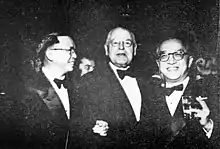Tsiang Tingfu
Tsiang Tingfu (Chinese: 蔣廷黻; pinyin: Jiǎng Tíngfú; 17 February 1895 – 9 October 1965), was a historian and diplomat of the Republic of China who published in English under the name T.F. Tsiang.
Tsiang Tingfu 蔣廷黻 | |
|---|---|
 Tsiang Tingfu as pictured in The Most Recent Biographies of Important Chinese People | |
| Born | 7 December 1895 |
| Died | 9 October 1965 (aged 69) |
| Nationality | Republic of China |
| Known for | Qing, Modern Chinese history |
| Scientific career | |
| Fields | Historian |
| Tsiang Tingfu | |||||||||||||||
|---|---|---|---|---|---|---|---|---|---|---|---|---|---|---|---|
| Chinese | 蔣廷黻 | ||||||||||||||
| |||||||||||||||
Early life and education
Tsiang was born in Shaoyang in Hunan Province. Tsiang's education from his teenage years had been Western and largely Christian, and he converted to Christianity at 11. Having been urged to study in the US by his teacher from a missionary school, he was sent in 1911 to study in the United States, where he attended the Park Academy, Oberlin College and Columbia University. His dissertation, "Labor and Empire: A Study of the Reaction of British Labor, Mainly as Represented in Parliament, to British Imperialism Since 1880," led him into issues in the relation of foreign relations and domestic politics, which would structure his scholarship after he returned to China. After obtaining a Ph.D., he returned to China in 1923, where he took up a position at Nankai University and then at Tsinghua University.[1]
Academic career

At Tsinghua, Tsiang became the head of the History Department, where he edited and published a number of works on Chinese history and edited the English-language journal Chinese Social and Political Science Review. Using newly-opened Qing dynasty archives and diplomatic publications, Tsiang argued that China should adopt Western approaches if it wanted to score diplomatic victories. Tsiang blamed China's unequal treatment by Western powers after the First Opium War (1839–42) on Chinese unequal treatment of Western powers before the war. During his tenure at Tsinghua, he mentored a number of historians in the study of Qing history, including John K. Fairbank.[2]
Diplomatic career
Following mounting tensions in China's relations with Japan, Tsiang left academia in 1935 and joined the Chinese Nationalist government, which he served in many different capacities throughout the Sino-Japanese War. In 1945, Tsiang became the Permanent Representative of China to the United Nations, and he also served as the ambassador of China to the United States. Following the establishment of the People's Republic of China on the Chinese mainland, Tsiang defended the exclusive right of the Taipei-based Republic of China to represent China in the United Nations and in the Security Council. He died of cancer in New York City on 9 October 1965, at 69.[3]
Selected writings
- Tingfu F. Tsiang, "Labor and Empire; a Study of the Reaction of British Labor, Mainly as Represented in Parliament to British Imperialism since 1880," Issued also as thesis (PH D) Columbia university Columbia university,, 1923).
- "New Light on Chinese Diplomacy, 1836-49," The Journal of Modern History 3.4 (1931): 578-591.
- "The Extension of Equal Commercial Privileges to Other Nations Than the British after the Treaty of Nanking," The Chinese Social and Political Science Review 15.3 (1931): 422-44.
- "The Present Situation in China: A Critical Analysis," International Affairs (Royal Institute of International Affairs 1931-1939) 14.4 (1935): 496-513.
- "Chinese and European Expansion," Politica 2.5 (March 1936): 1-18.
- 'Zhongguo jindaishi dagang (Outline of Modern Chinese History) (Chongqing: Qingnian shudian, 1939; rpr. Beijing: Dongfang chubanshe, 1996).
- Jiang Tingfu Xuanji 蔣廷黻選集 (Selected works of Jiang Tingfu) (Taipei: Wenxing, 1965 4 vols. Reprinted)
Notes
- Boorman (1967), p. 354.
- "T.F. Tsiang and Modernization," John King Fairbank, China Bound: A Fifty Year Memoir (New York: Harper & Row, 1982), 85-93
- "Events From Day to Day". Taiwan Today. 1 November 1965. Retrieved 5 April 2018.
References
- Boorman, Howard, ed. (1967). "Chiang T'ing-fu". Biographical Dictionary of Republican China Volume I. New York: Columbia University Press. pp. 354–358. ISBN 9780231089555.CS1 maint: ref=harv (link)
- T.F. Tsiang, (Crystal Lorch, ed.), Reminiscences of Ting-fu Fuller Tsiang: Oral History (New York: Columbia Center for Oral History, 1965.
- Charles Ronald Lilley, "Tsiang T'ing-Fu between Two Worlds, 1895-1935," (Doctoral Thesis University of Maryland, College Park, 1979).
External links
| Wikimedia Commons has media related to Tsiang Tingfu. |
- Description of the Tsiang Diaries
- Finding aid to the Tingfu Tsiang papers at Columbia University. Rare Book & Manuscript Library
- A film clip "Longines Chronoscope with Tsiang F. Tingfu" is available at the Internet Archive
- A film clip "Longines Chronoscope with Tsiang F. Tingfu" is available at the Internet Archive
| Diplomatic posts | ||
|---|---|---|
| Preceded by Quo Tai-chi |
Permanent Representative and Ambassador of China to the United Nations 1947–1962 |
Succeeded by Liu Chieh |
